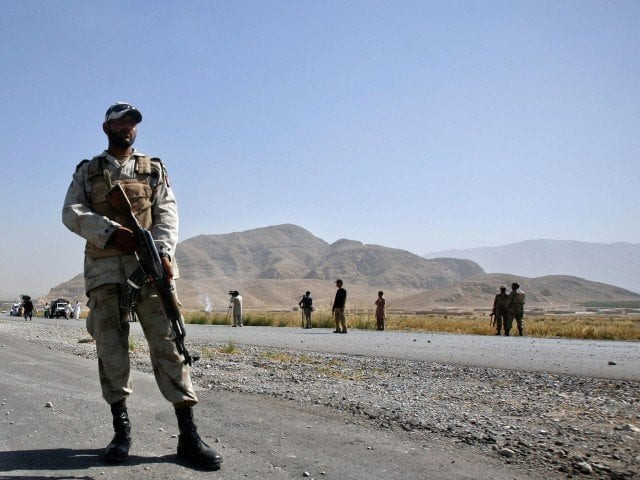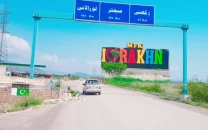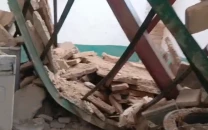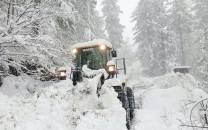A deadly decade for Balochistan
The 2010s tested the endurance of the province’s residents like no other era

File photo of a solder standing guard in Balochistan. PHOTO: REUTERS

The 2010s may have brought up multiple challenges for the entire country but the decade turned out to particularly grim for Balochistan. From terrorism and political unrest to natural disasters, the endurance of the people of the province was repeatedly tested over the last 10 years.
In some of the deadliest attacks the country witnessed in its struggle against militancy, Balochistan lost both a generation of Hazara community members and its lawyers. An entire young cohort of police cadets was murdered in cold blood, depriving both Balochistan and the rest of the country of would-be protectors, while flash floods rendered a large swathe of the province’s population homeless.
The story of Balochistan and its people in 2010s is a story of resilience in the face of seemingly insurmountable odds.
The last decade began with promise after the province received the welcome news of an increase in its share of the National Finance Commission award. The following year was marked by talk of making Gwadar, which would go on to become the centerpiece of the China-Pakistan Economic Corridor, the province’s winter capital. As things would go, the talk would remain talk and the move never happened.
The province was wracked by 55 violent incidents in 2011 which resulted in the loss of 284 lives. Hundreds more were displaced when flash floods washed away more than 150 houses in the northern and central Balochistan.
Violence increased drastically in 2012, with 475 people losing their lives in 76 terrorist incidents. One of the more grisly episodes was an attack on a university bus that robbed more than 60 people, mostly Hazara students, of their lives.
The next year, 2013, was both a year of political change and one of the deadliest in the province’s history. As many 644 people were killed in 71 violent incidents, which also left 915 injured. At least 85 people were killed in an attack on a snooker hall in Quetta, leading to angry protests from the Hazara community. A powerful earthquake also killed as many as 825 people and displaced thousands more, many of whom still await government support as we enter 2020.
On the political front, Dr Abdul Malik became the first ‘middle-class’ chief minister of Balochistan, providing a break from the trend of rule by tribal chieftains. Although his National Party did not sweep the elections, he received support from the Pakistan Muslim League-Nawaz, Pakhtunkhwa Milli Awami Party and Jamiat Ulema-e-Islam Fazl, which formed a coalition government in the province.
Balochistan’s struggle with violence continued in 2014, with 449 deaths in 59 grisly incidents. The provincial government also began the year by imposing an education emergency. Another 462 people were killed in 82 attacks the following year in 2015.
Between 2013 and 2015, the provincial government also carried out clandestine negotiations with proscribed Baloch groups. On August 5, 2014, it was reported that several major proscribed groups had agreed to negotiate with the state and on August 27, Baloch Republican Party head Brahamdagh Bugti even announced he would drop ‘separatist rhetoric’. But despite many olive branches from the government, the process fizzled out after Bugti contended that the chief minister had ‘no authority to negotiate with him’.
The year 2016 was another grisly one for the province, with 482 people killed in 55 attacks. Two of them would go on to be etched on the country’s psyche as 59 police cadets were murdered in cold blood by militants and 70 lawyers were killed in a suicide attack at a hospital where they had gathered to mourn the murder of their colleague, Bilal Anwar Kasi.
The following year, 2017, saw a slight turnaround from the sustained level of violence in the preceding years. Although a total of 37 violent incidents occurred, 259 people lost their lives, significantly lower than the previous half of the decade.
Decade in review: From the land of Sufis to the land of fear
Heavy rains and record-high snowfall led the government to declare an emergency, as 60,000 residents were left in dire need of assistance. The census exercise that year also revealed that the province’s Balochi-speaking population had shrunk to 55.6 per cent from 61 per cent.
Continuous heavy rains and snowfall have broken the record of many years caused widespread flooding across 3 districts of Balochistan from 17th to 22nd January 2017, the Government declared the emergency in 3 most affected districts and demanded assistance for 60,000 people affected in Balochistan.
Following a threat from a proscribed group, many local newspapers were also forced to halt circulation, depriving much of the province of news.
Violence rose again in 2018, with 316 people losing their lives in 33 attacks. On July 13, a suicide attack killed 131 people, including the Balochistan Awami Party (BAP) nominee for a provincial assembly seat Siraj Raisani. The province also lost its most vocal voice after senior journalist Siddiq Baluch succumbed to pancreatic cancer.
The year also saw a reversal in PML-N’s political fortunes after a no-confidence motion moved against its chief minister Sanaullah Zehri forced him to resign. Dissident PML-N leaders would then go on to form BAP for general elections later that year.
While 2019 has by no means been peaceful for Balochistan, violence did decrease sharply as 151 people were killed in 28 incidents. However, flash floods ravaged parts of the province once more, leading to 13 deaths and displacing 40,000 residents.
Quetta turns white with season’s first snowfall
“Balochistan’s security was at its worst the past decade,” reflected senior journalist Salam Ashraf while talking to The Express Tribune. “Sectarian and ethnic violence was at an all-time high, forcing many residents to migrate away from the province. The violence has had a heavy toll on the province, both politically and economically.”
NP General Secretary and former provincial government spokesman Jan Buledi, however, saw a silver lining in the past decade. “Yes, the security situation was troubled to say the least, but we improved in terms of rule of law and democracy,” he said. Even so, he cautioned that both the province and the country were at risk of falling into ‘old political habits’.
Published in The Express Tribune, January 3rd, 2020.



















COMMENTS
Comments are moderated and generally will be posted if they are on-topic and not abusive.
For more information, please see our Comments FAQ